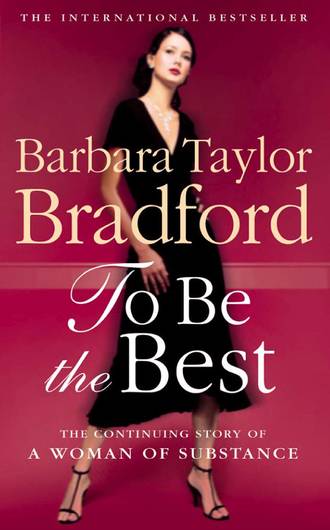
Полная версия
To Be the Best
Chapter 5
The Villa Faviola was situated in the town of Roquebrune-Cap Martin, approximately halfway between Monte Carlo and Menton.
It stood in its own small park at the end of the little peninsula of Cap Martin, sheltered by pines at its back, with its many tall windows facing out towards the sea.
Built in the 1920s, it was a lovely old house, sprawling, airy and gracious, with a curving driveway bordered by pines, spacious green lawns that swept down from the terrace past the swimming pool, up to the edge of the rocky promontory and the glittering Mediterranean Sea beyond.
Its exterior walls were painted a soft melon, but in a tone so pale it was almost sand, and the canvas awnings shading the windows were of a deeper melon, were partnered with shutters of pristine white.
A wide terrace stretched along the side of the house facing the sea and was made of white stone and marble, and it appeared to float gracefully above the verdant gardens where flowers grew in riotous colour and fountains sparkled in the shimmering sunlight. Scattered along the terrace were several round white-metal tables topped by melon-coloured parasols; matching white chairs, swing-sofas with sun-awnings, and chaises all had cushions of cream, and because only these soft integrated tones had been used nothing jarred the harmonious flow of pale colour across the lovely front façade.
The Villa Faviola had been purchased by Emma Harte in the late 1940s, just after the end of the Second World War, and it was she who had originally created the gardens surrounding the house and intersecting the lawns. But in recent years, Paula had enlarged the flower beds and borders and had planted a wide variety of small flowering trees and shrubs and exotic plants, cultivating the entire park to its present beauty – and a magnificence that was renowned along the Côte d’Azur.
Inside Faviola its cool, lofty rooms were filled with lovely filtered sunlight and furnished with a simple yet distinctive elegance. Charming old French Provincial pieces made of dark woods or bleached oak were mingled with vast sofas and comfortable chairs and there were chaises and ottomans, and occasional tables held small pots of African violets and pink and white cyclamen and the latest magazines and books.
Floors of highly polished parquet and rose-veined cream marble were either bare or were covered here and there by old Aubussons and plain rugs of cream wool, and throughout the house colours were pale and cool. Cream, vanilla and white predominated, flowed over the walls, were repeated in the fabrics that fell at the windows and covered sofas and chairs, and accent colours were variations of melon and peach and sand, and there were touches of café-au-lait, that lovely milky brown that was so typically French.
Spilling vivid colour into these monochromatic-toned rooms were romantic, lyrical paintings by such noted contemporary French artists as Epko, Taurelle and Bouyssou and huge Baccarat crystal urns overflowing with a great abundance of flowers and foliage from the gardens.
But none of the rooms were so imposing or so grand that guests and children were intimidated and felt they were in a museum and therefore hardly dare breathe. On the contrary, Emma had designed the house as a vacation home, one to be lived in and enjoyed to the fullest, and it had a great deal of comfort and an easy grace that was all its own. It also happened to be one of those houses that had always had a warm, welcoming and happy atmosphere, and there was a lovely serenity about its calm, sun-drenched rooms and the inviting pine-shaded park with its glorious gardens.
Alexander Barkstone owned Faviola, having inherited it from Emma along with its contents – with the exception of the Impressionist art, which his grandmother had bequeathed to Philip in Australia. But Sandy rarely came to the villa, preferring his country estate in Yorkshire, and it was mostly used by his sister Emily and her family, his cousins Paula O’Neill and Anthony Dunvale and their respective spouses and children, and occasionally his mother, Elizabeth, and her French husband, Marc Deboyne, who came down from Paris for long weekends, usually when the season was over.
But of all of them, it was Emily who loved Faviola the most – and with an enduring passion.
As a little girl some of the happiest times of her childhood had been spent at the villa with her beloved Gran, and she had always believed it to be an enchanted and magical place. She knew every cranny and every corner of every room on every floor, and every inch of the park and the garden and the beach below the rocky promontory. After she had married her cousin, Winston Harte, in June of 1970, they had flown down to the Riviera for their honeymoon and the first two weeks of their life as man and wife had been spent at the villa. The lovely carefree days and romantic evenings were so blissful, Emily’s deep feelings for Faviola were only intensified, and ever since then the villa had been her haven which she could escape to at odd times during the spring and winter, either alone or with Winston, and always in the summer months with their children, Toby, Gideon and Natalie. And she had never grown tired of it and she knew she never would, and she thought of the villa as the most perfect place in the world to be.
But in contrast, Sandy’s visits to the house had grown fewer and fewer after his wife’s death; in 1973, recognizing how much Emily loved the place, he had asked her to take over from him, to supervise its general management. He had been relieved and happy when she had promptly and enthusiastically agreed.
Inevitably, Emily had put her individual stamp on Faviola over the years, but she had not tried to turn it into a replica of an English country house. Instead she had retained its Gallic flavour in every possible way, and if anything she had even enhanced the predominantly Provençal feeling with her inimitable touches. But as involved with it as she had become in the last eight years, Emily never considered the villa to be her own, never once forgot that it was the property of her brother . And yet it was hers in a certain sense, because of the time and the care and the great love she constantly lavished on it, and certainly everyone thought of Emily as la grande châtelaine of the Villa Faviola.
When Emma Harte was living, the day-to-day running of the villa had been in the capable hands of a local woman from Roquebrune, one Madame Paulette Renard. Engaged by Emma in 1950, she had moved into the pleasant and roomy caretaker’s house in the private park – known as la petite maison – and had looked after the Harte family with unfailing care for the next twenty years.
But with Emma’s death in 1970, Madame Paulette had decided the time had come for her to retire and she had handed over her responsibilities and her keys to her daughter, Solange Brivet, who wished to leave her job as the housekeeper at a hotel in Beaulieu. Madame Paulette was a widow, and the Brivets and their children had been living with her in la petite maison for a number of years, and so there had been no great upheavals or sad goodbyes. And since it was only a short walk across the vegetable garden to the villa, Madame Paulette was always on hand to give her expert advice or air her considerable knowledge, and she was delighted she was still able to participate in life at the villa.
Over the past eleven years, the management and running of Faviola had become something of a Brivet family affair. Solange’s husband, Marcel, was the chef, two of their three daughters, Sylvie and Marie, were the maids, and their son, Henri, was the butler and, as Emily put it, ‘our general factotum par excellence’, while Marcel’s nephews, Pierre and Maurice, were the gardeners. These two drove over from Roquebrune in their little Renault every morning, bringing with them another Brivet, Cousin Odile, who worked in the kitchen as assistant to Marcel, and it was Odile who carried with her the huge basket of breads from her mother’s boulangerie … fresh croissants and brioche, which Marcel served warm for the family’s breakfast, and baguettes, those long French loaves with a hard crust which the children especially loved.
Madame Solange, as she was called by everyone, had been trained at the Hôtel de Paris in nearby Monte Carlo, and she ran the villa in the grand Riviera style, rather in the manner of a great hotel, with efficiency, meticulous attention to detail, and with the same kind of loving devotion her mother had expended before her. And in all the years she had been employed, she and Emily had worked together in harmony, with rarely, if ever, a cross word; to Emily the brisk, bustling, but very motherly Frenchwoman was indispensable.
The phrase, ‘Thank God for Solange,’ was forever on Emily’s lips, and she was muttering it under her breath on this August Monday morning as she hurried into the kitchen, stood in the centre of the floor, glanced around, and nodded to herself, looking pleased.
They had had their annual, end-of-the-summer dinner party last night, but no one would have known it from the look of the large, old-fashioned kitchen. As usual, the hanging pots and pans sparkled, the wood counter tops were scrubbed to gleaming white, the terracotta tile floor shone and everything else was spotless and back in its given place.
Solange must have really cracked the whip to get everything so ship-shape for this morning, Emily thought, recalling the mess in the kitchen the night before, after the last of their guests had finally departed. Smiling to herself, she took a glass from the cupboard, went to the refrigerator, poured herself some Vichy water, and carrying the glass she walked back through the pantry, across the dining room and out of the French doors onto the terrace, the clicking of her sandals the only sound on the warm, still air.
Emily was always the first one to be up and about every morning, sometimes as early as dawn.
She treasured this private time before the family awakened and the staff started to arrive. She liked being entirely alone to enjoy the gentle quiescence of the silent slumbering house, to savour the early morning smells and colours of the Mediterranean landscape.
It was also her hour for reviewing the paperwork she invariably brought with her, making notes for her secretary in London, whom she phoned several times a week, working out the day’s menus and planning activities for the children. But frequently she just sat quietly on the terrace, glad to have a few moments of solitude and introspection before the excitement of the day began and a horde of children descended on her, dragging a kind of chaos in their wake.
It was not so bad when she had only her own three to cope with, but when Paula’s four and Anthony’s three children were at Faviola, often bringing with them a number of young guests, it was rather like having an unruly juvenile football team underfoot. But Emily had her own system and she managed to control them far better than anyone else. It was not for nothing the children called her ‘The Sergeant Major’ behind her back.
Now, taking sips of Vichy as she walked, Emily went up to the edge of the terrace and leaned against the balustrade, looked out across the gardens to the sea. It was a dark metallic blue and choppy, and the sky that surged above it was a curdled cloudy grey that seemed ominous.
She hoped the weather was not going to change again, as it had last week when the mistral, that dry north wind that blew down out of the Rhône Valley, had brought several days of mean weather with it. Without exception, all of the children had been restive and moody and difficult, and Solange had immediately blamed the mistral, reminding Emily that this wind usually disturbed everyone’s equilibrium, and Emily had agreed, and they had both been relieved when it had finally blown out to sea. The weather had changed for the better – and so had the children. They were much calmer, almost their normal selves again, and even Emily felt more at ease. She had been edgy and irritable during those dull and incredibly windy days, and she now had to admit there was probably a lot of truth in what Solange – and the locals – said about the mistral and its peculiar effect on people. She glanced at her watch. It was only twenty minutes past six and by nine o’clock the sky would be a perfect cerulean blue, the sun would be out and the sea would be as still as a pond, she decided, as always the eternal optimist, as her grandmother had been before her.
Turning away from the balustrade, she stepped up to the table where she had laid out her papers a few minutes earlier, and sat down. As far as work was concerned, her immediate priority was her impending trip to Hong Kong to buy merchandise for Genret, the import-export trading company she ran for Harte Enterprises. She opened her diary and glanced at the dates in September she had tentatively selected some weeks ago. She flipped the pages backward and forward several times, carefully studied her schedule, pencilled in the changes she now wished to make, and began to scribble a note for Janice, her secretary in London, outlining her new itinerary.
A few minutes later, Emily almost jumped out of her skin as a strong cool hand came to rest firmly on her shoulders, and she started up in her chair and swung her head swiftly, her eyes wide with astonishment. ‘My God, Winston! You mustn’t creep up on me like that! So silently. You scared me!’ she cried.
‘Oh, sorry, darling,’ he apologized and bent over and kissed her cheek. ‘Good morning,’ he added as he walked across the terrace and leaned against the balustrade, where he stood regarding her lovingly for a moment before proffering her a warm smile.
Emily smiled back. ‘And tell me, what are you doing up so early? You’re usually dead to the world until ten o’clock at the earliest.’
Winston shrugged his bare shoulders, put the towel he was holding on the balustrade. ‘I couldn’t sleep this morning. But it’s always the same with me, isn’t it, Em? I mean, on our last few days here I seem to want to cram everything in, enjoy every single second, just like the kids.’
‘And as I do, too.’
‘Yes, that’s true … you do love this place so. But then it loves you, Emily … why you’re positively blooming.’
‘Thank you, kind sir,’ she said.
He eyed the glass in front of her. ‘I suppose that’s water you’re drinking … aren’t you going to make coffee?’
Emily shook her head. ‘No, Winston, I’m not,’ she said very adamantly. ‘Because if I do, I’ll also make some toast and I’ll butter the toast and put jam on it and then I’ll eat it, and when Odile arrives at seven, with all that scrumptious stuff from the bakery, I’ll have another breakfast, a second breakfast, and you know perfectly well that I’ve got to watch my weight.’
‘You look pretty terrific to me, Mrs Harte,’ he said with a chuckle and leered at her. ‘I don’t half fancy you.’
‘Honestly, Winston, at this hour!’
‘What’s wrong with this hour? It’s still very early … come on darling, let’s go back to bed.’
‘Oh don’t be so silly, I’ve a thousand things to do this morning.’
‘So do I,’ he remarked lightly, giving her a pointed look. Then his face changed suddenly, and he levelled a swift appraising glance at her, liking what he saw. Emily was now thirty-four and one of the prettiest women alive, in his opinion. She was blonder than ever and brown from the sun and her brilliant green eyes, so identical in colour to his own, sparkled with a vivid intelligence and a joie de vivre that were uniquely hers. She was wearing a lime-green-and-pink cotton shift over her bikini and looked impossibly young, fresh and delectable this morning.
‘Winston, you’re staring. And very rudely. What’s wrong?’
‘Nothing. Just admiring you, that’s all. And thinking that you look like a delicious ice cream … and good enough to eat.’
‘Oh pooh!’ Emily laughed, but her neck turned bright pink and she dropped her head, stared at her engagement book intently.
There was a tiny silence.
Winston swallowed a smile, both amused and pleased that he could still make her blush after eleven years of marriage, but then that was his Emily and he adored her for her girlishness and her femininity and her softness. Odd, he thought, that she can be so tough in business and yet she has such a soft edge to her in her personal life. Like Paula, of course, and Aunt Emma, when she was alive; it was just this dichotomy in their natures that made the Harte women so original. He had known that for a long time.
Emily raised her head. At once, she saw the contemplative expression on her husband’s face and asked, ‘And what are you thinking about now?’
‘I was just wondering what all this is in aid of this morning?’ Winston murmured, strolling over to join her at the table. He flopped down in the chair opposite and held her eyes as she looked across at him.
‘What do you mean?’ she asked, puzzled.
‘Why are you going at the work hammer and tongs today, when you’ll be back in London at the end of the week? It hardly seems worth it, love.’
‘I’m not working, actually, I’m trying to figure out the dates for my buying trip to Hong Kong and Mainland China,’ Emily explained. ‘If I leave on the tenth of September, instead of the sixth as I’d planned, I’d still be there when Paula breaks her return journey back to the States from Sydney. We were talking about it yesterday afternoon, and decided it would be nice to have a couple of days in Hong Kong. Relaxing … doing our Christmas shopping … and then we could fly on to New York together, spend a day or two there before taking the Concorde home to England. What do you think?’
‘It sounds good to me, if that’s what you feel like doing. I’ve certainly no objections, I don’t have to be in Canada until the first week of October. Presumably you’d be back in England before I left?’
‘Yes, of course I would. I’ve taken your Canadian trip into consideration and planned around it.’
‘Then it’s fine, darling,’ Winston answered with a smile and stood up, went to get his towel. ‘Well, if you’re not going to take pity on your poor husband and make him a cup of coffee, I think I’ll go for a swim before that tribe of fiendish little monsters invades the area and ploughs down everything in sight.’
Emily couldn’t help laughing at the expression on his face. ‘Oh I don’t know, darling, they’re not so bad,’ she protested, feeling the sudden need to defend the younger generation.
‘Oh yes they are!’ he retorted. ‘They’re bloody awful most of the time!’ A lopsided grin glanced across his face. ‘But I must admit, I do love ’em … especially the three that are mine.’ He kissed her quickly and loped off in the direction of the swimming pool without another word, nonchalantly swinging the towel and whistling merrily.
Emily watched him go, thinking how fit and healthy he looked with his tanned body and face and his reddish hair turned to gold by the Riviera sun. The summer here had done him good. He worked extremely hard running the Yorkshire Consolidated Newspaper Company and its Canadian subsidiaries, and she was always after him to slow down a bit. But he paid not the slightest attention to her, merely commented that they all worked like demons, which was true, of course. It was the way her Gran had brought them up. Emma had only disdained slackers, so naturally they had all become over-achievers.
How lucky I am to have Winston, Emily mused, settling back in the chair, idly drifting with her thoughts, putting off preparing the menus for that day’s meals for a few moments longer.
Sometimes, when she turned her gaze back into the past, she realized she had managed to catch him by the skin of her teeth, understood how easily she might have lost him to another woman.
Emily had been in love with Winston since she was sixteen. They were third cousins. His grandfather and namesake, Winston Harte, had been her grandmother’s brother. Although Winston was five years older than she, they had been bosom pals as children, but once he had grown up he had hardly noticed her again, at least not as an attractive young woman with whom he might become romantically involved.
He had gone off to Oxford with his best friend, Shane, and the two of them had rapidly acquired reputations as terrible womanizers. Almost everyone had been scandalized by their disreputable antics. She had ached with a mixture of jealousy and longing, wishing she were one of the girls Winston chased and bedded. Only her Gran had been sanguine. Emma had simply laughed, had said they were merely young bucks sowing their wild oats. But then neither Winston or Shane could do much wrong in Emma Harte’s eyes and she had had a special fondness for them both.
And so Emily had worshipped Winston from afar, hoping that one day his glance would fall on her again. But it hadn’t, and much to her profound dismay he suddenly became seriously involved with a local girl, Alison Ridley. At the beginning of 1969 the gossip going around the three clans was that he was about to get engaged to Alison. Emily had thought her heart was going to break.
Then everything had changed. Quite miraculously, Winston had noticed her at the christening of Paula and Jim Fairley’s twins in March of that same year. And all because of an incident with Shane which had upset her grandmother. She and Winston had been called into the library at Pennistone Royal and had been grilled by Emma about Shane’s feelings for Paula. When they had finally escaped, they had gone for a walk in the gardens to recover from their gruelling ordeal, and for some reason Winston had been prompted to kiss her. This action on his part had been as sudden as it was unexpected, and Emily, loving him though she did, had been as stunned as he by their intense physical reaction to each other as they had sat on the bench by the lily pond, entwined in each other’s arms. The world had turned dizzily and wonderfully upside down for them both.
Winston, in typical Harte fashion, had wasted little time. The moment their affair had begun he had broken off with Alison, and shortly thereafter he had asked Emily’s grandmother if they could become engaged. Emma had given her consent, thoroughly approving of the match between her granddaughter and her great nephew. And one year later, when her Gran had returned from Australia, they had been married in the quaint old church in Pennistone village, and Gran had given the most beautiful wedding reception for them in the gardens of Pennistone Royal; her life as Winston’s wife had begun … and it was the best life any woman could ever want …
Emily sighed with contentment, brought her thoughts back to the present, picked up her pen and began to write out the menu for lunch. When she finished, she started on the one for dinner, but stopped abruptly as an idea occurred to her. Tonight, she and Winston, Paula and Shane, would drive over to Beaulieu and have dinner at La Reserve. Just the four of them. Without the tribe. That would be much more peaceful. Not to mention romantic. Winston will approve, she thought, and smiled a small secret smile.
Chapter 6
‘You clot! You unbelievably stupid clot! Look what you’ve done! You’ve splashed my beautiful painting and ruined it!’ Tessa Fairley yelled at the top of her lungs, glaring at Lorne, adopting an angry stance, waving the paintbrush in the air.
‘The side of the swimming pool is hardly the proper place to set up an easel and start painting,’ Lorne rejoined loftily, returning her glare. ‘Especially when everyone’s leaping in and out of the pool. It’s your own fault the watercolour’s been splashed, not mine. And one more thing – I’m not a stupid clot.’
‘No, you’re a stupid CRETIN,’ his twelve-year-old twin shot back, then sucked in her breath with a horrified gasp. ‘Don’t do that, Lorne Fairley! Don’t shake yourself like that! Oh! Oh! you rotten thing. You’ve spoiled my other pictures. Oh, God, you’ve made them all trickly.’ She had the sudden murderous urge to bash her brother in the head, to do him some kind of bodily harm, but instantly suppressed it because of her mother’s presence this morning. ‘Mummy … Mummy … tell Lorne to stay away from my paintings drying on the grass,’ she wailed.







